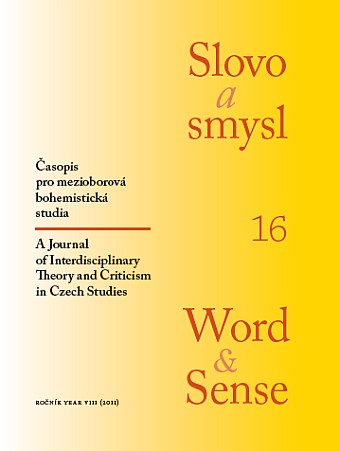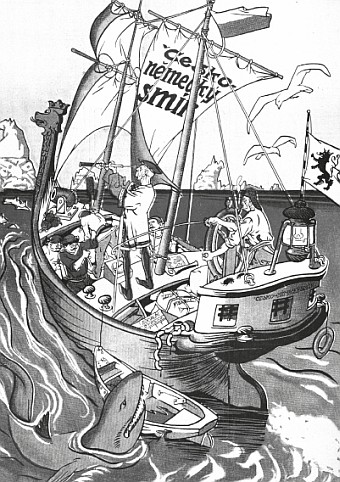Editorial
Issue 16 of the journal Slovo a smysl, focuses on the topic of Central‑European relationships and contexts. It presents texts that in various historical examinations analyze in‑between‑spaces of diversity, encounters and clashes, texts that bring attention to the possibility of seeing the literary‑historical phenomena in broader stylistic, intellectual, and social contexts. In the Studies section, Xavier Galmiche offers insight into multicultural spaces by delineating and considering the phenomenon of “toponymical declension” as a mutable complex of naming and re‑naming, their motivations, variants and meanings, which open up the questions of identity and difference, self‑evidence, and diversity of memory. Rudolf Kučera shows the transformations of the term, concept and institutional tool of the Middle (mid‑Central, Central) Europe in German historiography of the last sixty years, which became a theme in its own right, the subject of “immediately lived” international dialogue of historians. Daniel Vojtěch examines the Prague encounters of Paul Claudel at the beginning of the second decade of the twentieth century as a possibility for understanding the historical significance of the situation of Modernism in the Czech lands, its forms, alternatives, intellectual contexts, and critical reflections in the search for Central European identity. Petr Málek considers the transformations of nautical metaphors and imagination in literary and artistic traditions, as well as in philosophical reflections, in order to interpret the images of shipwreck as an expression of a certain constellation and metaphoric nature of the Central‑European/ Czech Modernism from 1910 to the 1930s, in the representative exemplary texts of the Čapek brothers, Franz Kafka and Richard Weiner.
The following section, Sketches, includes articles focusing on personalities, whose activities enable to capture typical features of the time as well as general meanings in intercultural and multilingual spaces and relationships. Václav Petrbok returns to the polemical discussion in the mid 1840s between the protagonists Siegfried Kapper and Karel Havlíček, to the issues of “revolutionariness” and patriotic tendentiousness and to the questions of the possibilities of integration in the Czech‑Jewish‑German confrontation. In her Blanchot article, Kristýna Celhofferová sheds light on the influence of Gluck’s music on the representatives of literary Modernism at the turn of the 20th century, and finds its inspiration (the myth of Orpheus, melancholy and syntheticity, etc) with Stefan Zweig and Julius Zeyer. Michal Topor examines, from several points of view, the spiritual and intellectual coordinates, leitmotifs and circumstances in the articles of the journalist and prose writer Alfred Fuchs from the 1910–1920s; he interprets the author’s search for the personal journey of conversion as well as the general traits of the relationships between Czech‑Jewish and Catholic worlds. Matouš Jaluška analyzes the concept of illness as a specific metaphor of the meaning of life in the texts by Bruno Schulz and Susan Sontag; he explains and differentiates their contexts, contradictory roots, intellectual practices, and consequences.
Kurt Krolop, the scholar of German and Slavic literature, writes about some aspects and the ambiguity of the term Central Europe and about our need to be conscious of its historicity and changeability, mainly in the light of the examination of Czech‑German relationships; Questions for… prepared and introduced Václav Petrbok and Michal Topor. Also the Critical Views, in their own way – with methodological emphasis – touch on the inter‑textual questions and realms; they include the reflection of Petra Hesová about the Sabina monograph by Michal Charypar; Lucie Merhautová discusses the Zeyer monograph by Tereza Riedlbauchová. The translation section of this issue is rich. The part Translations – Překlady introduces a study of the Polish literary historian Jerzy Jarzebsky Byc wieszszem / Být věštcem from 1981 (translated into Czech by Martin Veselka), which discusses, on the basis of the description (in terms of reception) of the leading position in the framework of national literature, the mutual encounters, touching points, and ideological contestations between Witold Gombrowicz and Czeslaw Milosz. The part Překlady – Translations makes available in English the essay by Jan Patočka Německá duchovnost Beethovenovy doby/The German Spirit in Beethoven’s Era, published for the first time in 1971 (translated by Martin Pokorný, with an introduction by Daniel Vojtěch), which, based on an analysis of the philosophical and aesthetic culture of the turn of the 18th century, characterizes Central European alternative modernities.
Red


